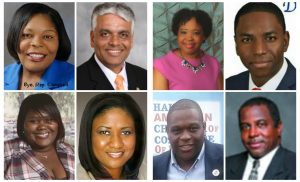Keon Hardemon blasts Miami Beach’s “Draconian” Spring Break measures
Posted by Admin on Mar 7, 2024 in Fresh Colada, Keon Hardemon, News, Spring Break | 0 commentsSays new rules target people who ‘look like me’
read more

Says new rules target people who ‘look like me’
A new PAC for incumbent reported $375 in donations
Kase-who?
Miami-Dade Commissioners voted unanimously Tuesday to give the naming rights to the former American Airlines Arena — which, admit it, is what everybody still calls it even after it became the FTX Arena — to a local cybersecurity software company that almost nobody ever heard of before.
Newly-elected Miami Commissioner Christine King had her first city commission meeting Thursday and was praised and complimented by her colleagues on her solid victory Nov. 2.
“You didn’t win, you got a mandate,” said Commissioner Alex Diaz de la Portilla, who had lobbied hard to appoint her last year to fill the seat vacated when Commissioner Keon Hardemon ran for the county seat. DLP said her getting 65% of the vote was a reflection of her service to the community for the past several years as president of the Martin Luther King Economic Development Corp.
Miami-Dade Commissioner Keon “Pay-to-Play” Hardemon showed his true petty colors on Tuesday when he tried to take $550,000 allocated in the county budget from the Sant La Haitian Neighborhood Center in North Miami — which just so happens to be operated by Gepsie Metellus, who ran against him last year for the seat vacated by Audrey Edmonson.
And he did it using the same dirty tactics he used in the campaign.
The exit of State Rep. Daphne Campbell into a Senate run  has created an open seat and the largest clusterbunch of Democrats in any primary in the whole state of Florida.
has created an open seat and the largest clusterbunch of Democrats in any primary in the whole state of Florida.
There are seven candidates running to replace Campbell in House District 108. Count ’em. Seven! Sure, there are other races where there might be five or six wannabes. But all those include both parties and usually a write-in candidate. No other race has as many competing in the primary in the whole Sunshine State. The next biggest bout is the five-way Republican brawl in District 118, which we will get to later.
In District 108 — which encompasses North Miami, Biscayne Park, Miami Shores, El Portal and parts of the city of Miami from the 195 to the Golden Glades interchange — the seven hopefuls are: Roy Hardemon, uncle of Miami City Commissioner Keon Hardemon; former Campbell campaign staffer Fayola Delica, immigrant rights activist Francesca “Fran” Menes, former schoolteacher Moise Duge, former North Miami City Councilwoman Marie Erlande Steril, Indian-born businessman Henry Patel and Taj Collie-Echoles, who ran against Campbell in the 2014 primary and lost with only 17% of the vote.
are: Roy Hardemon, uncle of Miami City Commissioner Keon Hardemon; former Campbell campaign staffer Fayola Delica, immigrant rights activist Francesca “Fran” Menes, former schoolteacher Moise Duge, former North Miami City Councilwoman Marie Erlande Steril, Indian-born businessman Henry Patel and Taj Collie-Echoles, who ran against Campbell in the 2014 primary and lost with only 17% of the vote.
Those kind of numbers could be a victory for Collie-Echoles this time around. With seven candidates vying for votes, the next state rep for district 108 might very well be elected by less than 20% of the voters.
Right now, it looks like the contest is a three-way between Steril, who must enjoy good name recognition, Menes — who has the Ruth’s List and the Florida Young Democrats’ endorsements — and Patel, who puts his money where his mouth is. Patel leads the pack with $48,000 in his campaign account, including $15,000 he loaned himself. Steril reported $29,000 in contributions and Menes lists $26,665 collected so far.
Despite his politically connected nephew, Hardemon hasn’t reported raising a dime and none of the other three candidates have raised more than $6,000, which makes it hard for them to get voters to notice.
This is a solidly Democrat district. Not a single Republican is running. So whoever wins next month without a majority is our new state rep. Like it or not.